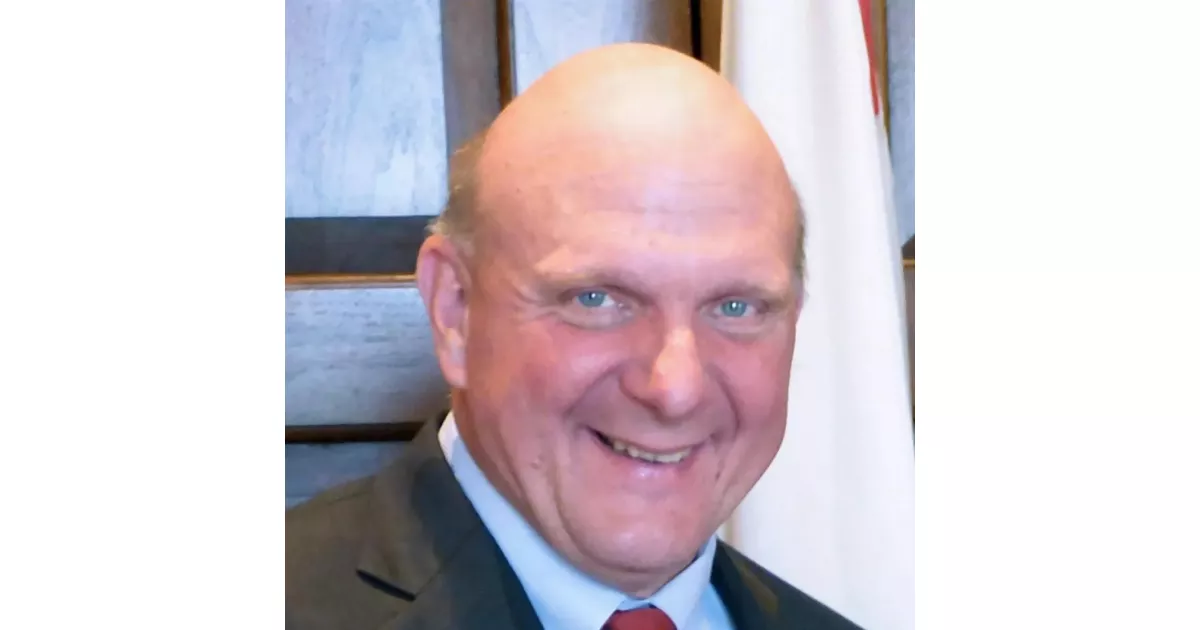Steve Ballmer is an American businessman best known for his tenure as CEO of Microsoft from 2000 to 2014. During his leadership, Microsoft navigated the dot-com bubble burst and shifted towards cloud computing. He is recognized for his energetic and passionate presentations. Beyond Microsoft, Ballmer owns the Los Angeles Clippers NBA team. He is also a co-founder of Ballmer Group, a philanthropic organization focusing on social mobility and community development.
1923: Birth of Frederic Henry Ballmer
In 1923, Frederic Henry (Fritz Hans) Ballmer, Steve Ballmer's father, was born.
1948: Frederic Ballmer Arrives in the United States
In 1948, Frederic Ballmer, Steve Ballmer's father, arrived in the United States from Switzerland.
1964: Ballmer Lived in Brussels
From 1964 to 1967, Steve Ballmer lived in Brussels and attended the International School of Brussels.
1967: Ballmer Lived in Brussels
From 1964 to 1967, Steve Ballmer lived in Brussels and attended the International School of Brussels.
1973: Ballmer Attended College Prep Classes
In 1973, Steve Ballmer attended college prep and engineering classes at Lawrence Technological University.
1977: Ballmer Graduated from Harvard
In 1977, Steve Ballmer graduated magna cum laude with a Bachelor of Arts in applied mathematics and economics from Harvard College.
June 11, 1980: Ballmer Joins Microsoft
On June 11, 1980, Steve Ballmer joined Microsoft as the 30th employee and the first business manager hired by Bill Gates.
1980: Ballmer Dropped Out of Stanford to Join Microsoft
In 1980, Steve Ballmer dropped out of the Stanford Graduate School of Business to join Microsoft.
1980: Hired by Microsoft
In 1980, Steve Ballmer was hired by Bill Gates at Microsoft. He left the MBA program at Stanford University to join the company.
1981: Ballmer Acquired Stake in Microsoft
When Microsoft was incorporated in 1981, Steve Ballmer owned 8% of the company.
1986: Parody Video for Windows 1.0
In 1986, Steve Ballmer produced a parody video promoting Windows 1.0 in the style of a Crazy Eddie commercial.
1990: Married Connie Snyder
In 1990, Steve Ballmer married philanthropist Connie Snyder.
February 1992: Ballmer Becomes Executive Vice President
In February 1992, Steve Ballmer became the Executive Vice President for Sales and Support at Microsoft.
1994: $10 million donation to Harvard computer science
In 1994, Steve Ballmer and Bill Gates made a joint gift of $10 million to Harvard University's computer science department.
July 1998: Ballmer Promoted to President of Microsoft
In July 1998, Steve Ballmer was promoted to President of Microsoft.
January 13, 2000: Ballmer Becomes CEO of Microsoft
On January 13, 2000, Steve Ballmer replaced Bill Gates as the CEO of Microsoft.
July 2000: Called Linux "communism"
In July 2000, Steve Ballmer referred to the free software Linux kernel as "communism" and claimed it infringed on Microsoft's intellectual property.
September 2000: "I love this company!"
In September 2000, at Microsoft's 25th anniversary event, Steve Ballmer jumped across the stage and shouted, "I love this company!", which became a widely circulated video.
2000: Ballmer Becomes CEO
In 2000, Bill Gates was glad Steve Ballmer became CEO so he could focus on technology, but the Wall Street Journal reported there was tension surrounding the transition of authority.
2000: Death of Frederic Ballmer
In 2000, Frederic Ballmer, Steve Ballmer's father, passed away.
February 2001: Ballmer Sheds Title of President
In February 2001, Steve Ballmer relinquished the title of president after becoming CEO.
June 2001: Called Linux a "cancer"
In June 2001, Steve Ballmer described Linux as a "cancer that attaches itself in an intellectual property sense to everything it touches."
2001: Director of Accenture
In 2001, Steve Ballmer became a director of Accenture.
2001: Comments on Linux
In 2001, Steve Ballmer made comments about Linux that he later said were correct at the time.
April 2003: Plead with Mayor of Munich not to switch to Linux
In April 2003, Steve Ballmer interrupted his skiing holiday in Switzerland to personally plead with the mayor of Munich not to switch to Linux, but he did not succeed.
2003: Ballmer Sold Microsoft Shares
In 2003, Steve Ballmer sold 39.3 million Microsoft shares for about $955 million, reducing his ownership to 4%.
2004: Chair-throwing incident after Lucovsky leaves for Google
In 2004, Mark Lucovsky reported that Steve Ballmer threw a chair across his office and vowed to "kill Google" after Lucovsky announced he was leaving Microsoft for Google.
2005: Microsoft sued Google for hiring Kai-Fu Lee
In 2005, Microsoft sued Google for hiring its former vice president, Kai-Fu Lee, alleging violation of his non-compete clause.
2005: Recruitment of B. Kevin Turner
In 2005, Steve Ballmer recruited B. Kevin Turner from Walmart to become Microsoft's chief operating officer.
2006: Gates Relinquished Day-to-day Activities
In 2006, Bill Gates relinquished day-to-day activities at Microsoft, giving Steve Ballmer more autonomy as CEO.
2006: Left Accenture
In 2006, Steve Ballmer ended his role as director of Accenture.
2007: Prediction about iPhone Market Share
In 2007, Steve Ballmer stated, "There's no chance that the iPhone is going to get any significant market share. No chance."
March 6, 2008: Commitment to invest in KeyArena renovation and purchase SuperSonics
On March 6, 2008, Seattle mayor Greg Nickels announced that a local ownership group involving Steve Ballmer made a commitment to invest $150 million in cash toward a proposed $300 million renovation of KeyArena and were ready to purchase the Seattle SuperSonics, but this initiative failed.
2009: Criticism of Apple's pricing
In 2009, at a conference in NYC, Steve Ballmer criticized Apple's pricing strategy, suggesting that consumers would find it challenging to pay an extra $500 for a computer with just a logo.
2011: Remarks at Web 2.0 Summit about Windows Phone and Android
During the 2011 Web 2.0 Summit in San Francisco, Steve Ballmer stated that a computer science background wasn't necessary to use a Windows Phone, unlike an Android phone, and expressed a lack of excitement for Android phones.
May 2012: Call for Ballmer to Step Down
In May 2012, hedge fund manager David Einhorn called on Steve Ballmer to step down as CEO of Microsoft.
June 2012: Investor in proposal to build a new arena
In June 2012, Steve Ballmer invested in Chris R. Hansen's proposal to build a new arena in the SoDo neighborhood of Seattle and bring the SuperSonics back to Seattle.
June 19, 2012: Microsoft Surface Tablet Revealed
On June 19, 2012, Steve Ballmer revealed Microsoft's first ever computer device, the Microsoft Surface tablet.

2012: Company Profit Growth in 2012
In 2012, Microsoft increased its profit 19% over the previous quarter, with the Microsoft Business Division (including Office 365) and Server and Tools division (cloud services) becoming larger than the Windows division.
2012: Shift Away from PC-First Heritage
In 2012, Steve Ballmer oversaw a shift away from Microsoft's PC-first heritage, leading to a product lineup considered the best in the company's history.
January 9, 2013: Attempt to Purchase Sacramento Kings
On January 9, 2013, Steve Ballmer and Chris Hansen led an investor group's attempt to purchase the Sacramento Kings for an estimated $650 million, aiming to relocate the team to Seattle, but this attempt also fell through.
April 2013: Quarterly Results Reported in April 2013
In April 2013, Microsoft reported that while Windows Phone 8 and Windows 8 had not increased their market share above single digits, the company increased its profit 19% over the previous quarter in 2012.
August 23, 2013: Announcement of Ballmer's Retirement
On August 23, 2013, Microsoft announced that Steve Ballmer would retire within the next 12 months.
September 2013: Acquisition of Nokia's Mobile Phone Division
In September 2013, Steve Ballmer announced Microsoft's purchase of Nokia's mobile phone division.
September 2013: Last company meeting
In September 2013, Steve Ballmer hosted his last company meeting at Microsoft.
2013: Regret over lack of focus on Windows Mobile
In 2013, Steve Ballmer expressed regret over the lack of focus on Windows Mobile in the early 2000s, acknowledging Microsoft's distant third position in the smartphone market. He also attributed the success of iPhones to carrier subsidies.
2013: Called Google a "monopoly"
In 2013, Steve Ballmer referred to Google as a "monopoly" and suggested it should face pressure from market competition authorities.
2013: Ballmer Named One of the Worst CEOs
In 2013, Steve Ballmer was named one of the worst CEOs by the BBC.
February 4, 2014: Ballmer Retires as CEO of Microsoft
On February 4, 2014, Steve Ballmer retired as CEO of Microsoft and was replaced by Satya Nadella.
May 2014: Highest bidder for Los Angeles Clippers
In May 2014, Steve Ballmer was the highest bidder in an attempt to purchase the Los Angeles Clippers for a reported price of $2 billion.
August 12, 2014: Ballmer becomes Los Angeles Clippers owner
Following the Donald Sterling scandal, on August 12, 2014, it was announced that Steve Ballmer would become the Los Angeles Clippers owner after a California court confirmed Shelly Sterling's authority to sell the team.
August 2014: Stepped down from Microsoft's board of directors
In August 2014, Steve Ballmer stepped down from Microsoft's board of directors.
August 19, 2014: Ballmer Leaves Microsoft's Board of Directors
On August 19, 2014, Steve Ballmer left Microsoft's board of directors.
September 25, 2014: Banned Apple products from Los Angeles Clippers
On September 25, 2014, Steve Ballmer announced that he would bar the Los Angeles Clippers from using Apple products such as iPads, replacing them with Microsoft products, and had previously banned his family from using iPhones.

October 2014: Strained Relationship with Bill Gates
In October 2014, a few months after Steve Ballmer left Microsoft, it was reported that he and Bill Gates no longer talked to each other due to animosity over Ballmer's resignation.
November 12, 2014: $50 Million Donation to University of Oregon
On November 12, 2014, Steve Ballmer and his wife Connie donated $50 million to the University of Oregon to support scholarships, public health research, and branding efforts.
November 13, 2014: Estimated $60 Million Gift to Harvard University's Computer Science Department
On November 13, 2014, it was announced that Steve Ballmer would donate a gift, estimated at $60 million, to Harvard University's computer science department to hire new faculty and increase the program's national stature.
December 24, 2014: IRS Sues Ballmer and others over Microsoft's tax audit
On December 24, 2014, the Seattle Times reported that the IRS sued Steve Ballmer, along with other executives, in an effort to compel them to testify in Microsoft's corporate tax audit, which was looking into transfer pricing.
2015: Co-founded Ballmer Group
In 2015, Steve Ballmer and his wife co-founded Ballmer Group, a philanthropic investment company focused on helping children from poor families achieve economic mobility.
March 2016: Changed stance on Linux
In March 2016, Steve Ballmer changed his stance on Linux, expressing support for his successor Satya Nadella's open source commitments.
November 2016: Ballmer Comments on Relationship with Gates
In a November 2016 interview, Steve Ballmer stated that he and Bill Gates have "drifted apart" ever since his resignation from Microsoft.
2016: Revisited iPhone statements
In 2016, Steve Ballmer revisited his earlier statements about the iPhone, explaining that his initial concern was the high price of $600–$700, and he didn't anticipate that carriers would incorporate the cost into monthly bills.
2017: Launched USAFacts.org
In 2017, Steve Ballmer launched USAFacts.org, a not-for-profit organization aimed at enabling people to understand U.S. government revenue, spending, and societal impact. He contributed $10 million to fund research teams.
March 2020: Agreed to buy The Forum
In March 2020, Steve Ballmer agreed to buy The Forum in Inglewood, California, to enable the construction of Intuit Dome nearby, as plans for a new Clippers' arena faced opposition from The Forum's former owners.
December 2020: Voted Best Owner in Basketball
In a survey conducted by The Athletic in December 2020, Steve Ballmer was voted the best owner in basketball.
2021: ProPublica documented tax strategies
In 2021, ProPublica reported that Steve Ballmer is using his ownership of various sports teams as a means to lower his federal income tax, compared to around 35% for the athletes playing in the team.
2022: $425 Million Donation to University of Oregon
In 2022, Steve Ballmer donated $425 million to the University of Oregon to fund a new institute for children's behavioral health.
2023: Report on Tax Advantaged Loss Harvesting
In 2023, ProPublica reported on Steve Ballmer's usage of wash sales helped by Goldman Sachs, under the label "Tax Advantaged Loss Harvesting", resulting in tax savings of more than half a billion dollars over 5 years
2024: Properties near Coupeville, Washington
As of 2024, Steve and Connie Ballmer owned a total of 10 properties near Coupeville, Washington.
March 5, 2025: Ballmer's Estimated Wealth in 2025
On March 5, 2025, the Bloomberg Billionaires Index estimated Steve Ballmer's wealth at around $136 billion, making him the tenth-richest person in the world.
March 2025: Estimated Personal Wealth
As of March 2025, Steve Ballmer's personal wealth was estimated at around $136 billion by the Bloomberg Billionaires Index, making him the tenth-richest person in the world.
Mentioned in this timeline

Basketball is a team sport played on a rectangular court...
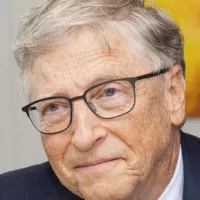
Bill Gates an American businessman and philanthropist revolutionized personal computing...
Xbox is a video gaming brand owned by Microsoft Gaming...
California is a U S state on the Pacific Coast...
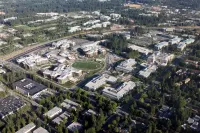
Microsoft an American multinational technology corporation headquartered in Redmond Washington...
CNN Cable News Network is an American multinational news media...
Trending

36 minutes ago Selena Gomez's Spiced-Plum Manicure and TikTok Clone Theory Spark Buzz

36 minutes ago Kit Harington and Sophie Turner Gag After On-Screen Kiss in New Movie

36 minutes ago Trump administration updates, Iran nuclear efforts, and White House controversies unfold.
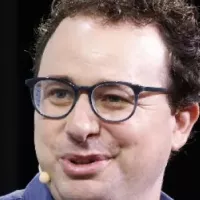
37 minutes ago Dario Amodei Highlights India's Central Role in Shaping AI's Future at AI Summit.
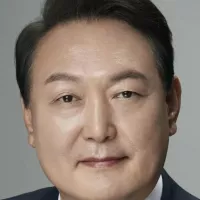
2 hours ago Yoon Suk Yeol, South Korean ex-president, receives life sentence for insurrection and martial law.

4 hours ago Maya Hawke and Christian Lee Hutson celebrated wedding with Stranger Things cast present.
Popular

Jesse Jackson is an American civil rights activist politician and...
Randall Adam Fine is an American politician a Republican who...

Pam Bondi is an American attorney lobbyist and politician currently...

Barack Obama the th U S President - was the...

Martin Luther King Jr was a pivotal leader in the...

Ken Paxton is an American politician and lawyer serving as...
